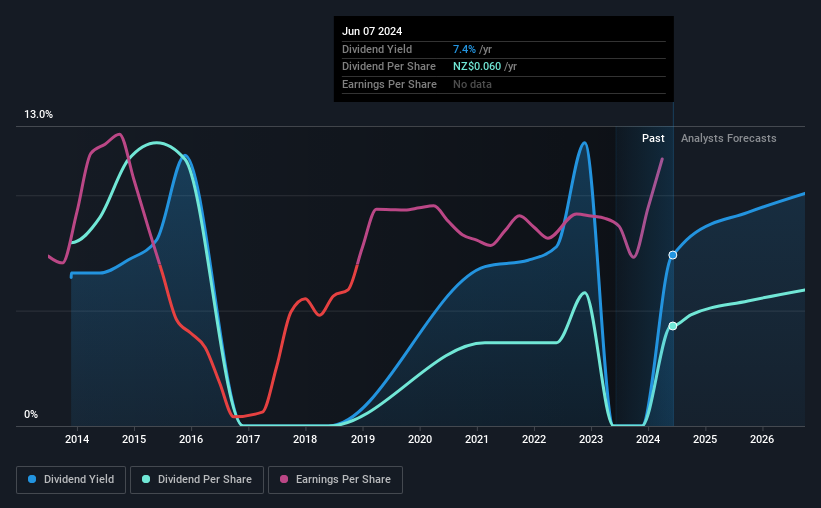- New Zealand
- /
- Insurance
- /
- NZSE:TWR
Be Sure To Check Out Tower Limited (NZSE:TWR) Before It Goes Ex-Dividend

It looks like Tower Limited (NZSE:TWR) is about to go ex-dividend in the next four days. The ex-dividend date occurs one day before the record date which is the day on which shareholders need to be on the company's books in order to receive a dividend. The ex-dividend date is of consequence because whenever a stock is bought or sold, the trade takes at least two business day to settle. Accordingly, Tower investors that purchase the stock on or after the 12th of June will not receive the dividend, which will be paid on the 27th of June.
The company's next dividend payment will be NZ$0.03 per share. Last year, in total, the company distributed NZ$0.06 to shareholders. Based on the last year's worth of payments, Tower stock has a trailing yield of around 7.4% on the current share price of NZ$0.81. Dividends are a major contributor to investment returns for long term holders, but only if the dividend continues to be paid. We need to see whether the dividend is covered by earnings and if it's growing.
View our latest analysis for Tower
Dividends are typically paid from company earnings. If a company pays more in dividends than it earned in profit, then the dividend could be unsustainable. Fortunately Tower's payout ratio is modest, at just 33% of profit.
Generally speaking, the lower a company's payout ratios, the more resilient its dividend usually is.
Click here to see the company's payout ratio, plus analyst estimates of its future dividends.

Have Earnings And Dividends Been Growing?
Stocks with flat earnings can still be attractive dividend payers, but it is important to be more conservative with your approach and demand a greater margin for safety when it comes to dividend sustainability. Investors love dividends, so if earnings fall and the dividend is reduced, expect a stock to be sold off heavily at the same time. With that in mind, we're not enthused to see that Tower's earnings per share have remained effectively flat over the past five years. It's better than seeing them drop, certainly, but over the long term, all of the best dividend stocks are able to meaningfully grow their earnings per share.
The main way most investors will assess a company's dividend prospects is by checking the historical rate of dividend growth. Tower has seen its dividend decline 5.9% per annum on average over the past 10 years, which is not great to see.
The Bottom Line
Should investors buy Tower for the upcoming dividend? Earnings per share have been flat in recent years, although Tower reinvests more than half its earnings in the business, which could suggest there are some growth projects that have not yet reached fruition. We think this is a pretty attractive combination, and would be interested in investigating Tower more closely.
While it's tempting to invest in Tower for the dividends alone, you should always be mindful of the risks involved. Our analysis shows 1 warning sign for Tower and you should be aware of it before buying any shares.
A common investing mistake is buying the first interesting stock you see. Here you can find a full list of high-yield dividend stocks.
Valuation is complex, but we're here to simplify it.
Discover if Tower might be undervalued or overvalued with our detailed analysis, featuring fair value estimates, potential risks, dividends, insider trades, and its financial condition.
Access Free AnalysisHave feedback on this article? Concerned about the content? Get in touch with us directly. Alternatively, email editorial-team (at) simplywallst.com.
This article by Simply Wall St is general in nature. We provide commentary based on historical data and analyst forecasts only using an unbiased methodology and our articles are not intended to be financial advice. It does not constitute a recommendation to buy or sell any stock, and does not take account of your objectives, or your financial situation. We aim to bring you long-term focused analysis driven by fundamental data. Note that our analysis may not factor in the latest price-sensitive company announcements or qualitative material. Simply Wall St has no position in any stocks mentioned.
About NZSE:TWR
Tower
Provides general insurance products in New Zealand and the Pacific Islands.
Solid track record with excellent balance sheet and pays a dividend.


